Bali Hai Restaurant Ashtray

This glass ashtray is from the Bali Hai Restaurant in San Diego, CA. Screen printed on the ashtray is a Tiki and the words “Bali Ha’i”, “Shelter Island”, “Point Loma”, “San Diego”, and “Calif.”

This glass ashtray is from the Bali Hai Restaurant in San Diego, CA. Screen printed on the ashtray is a Tiki and the words “Bali Ha’i”, “Shelter Island”, “Point Loma”, “San Diego”, and “Calif.”

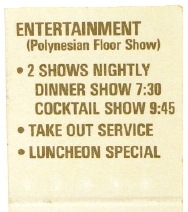
The Bali Hai Supper Club was a Polynesian-themed restaurant in Maplewood, MN. The Bali Hai Supper Club had pu pu platters, volcano bowls, and a Polynesian dance show.
The Bali Hai Supper Club opened in 1976 by Ping and Pat Chan and closed in 2000. It was subsequently demolished and replaced with a strip mall.
Found in the Labeled, Matchbook, Polynesian Pop, Tiki, and Twin Cities Collections.
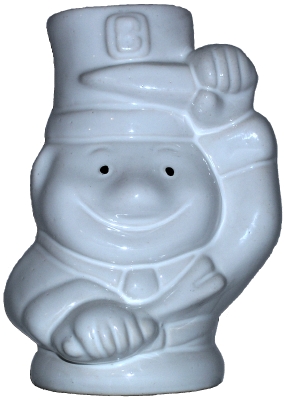
This mug depicts a chef, possibly a teppanyaki chef, holding a knife and a two-tined fork. On this cap is the raised letter “B”. On the back, in raised lettering, is “Benihana”. There are no other markings on this mug. There is an opening in the back for adding a beverage.
Found in the Benihana, Labeled, Mug, and Orientalia Collections.
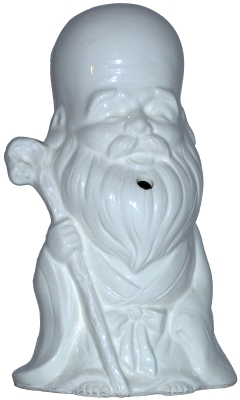
This glazed ceramic mug depicts the likeness of Fukurokuju, the God of Wisdom and Longevity, one of Japan’s Seven Lucky Gods. He is often depicted as an old man with a long white beard and an unusually high forehead. In this depiction, he is wearing a robe and carrying a cane. You can see his feet peaking out from under the bottom of his robe.
There is hole in his beard for a straw and a larger hole on the back for adding a bevarege. On his back, in raised lettering, is “Benihana of Tokyo” and on the bottom, printed in ink, is “Japan”.
Similar mugs in my collection include the Dynasty Wholesale DW130 Jurojin mug.
Found in the Benihana, Labeled, Mug, and Orientalia Collections.
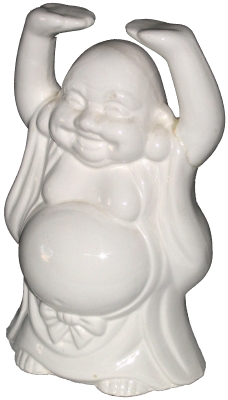
This white ceramic mug from Benihana depicts Hotei. Hotei, one of Japan’s Seven Lucky Gods, is known variously as the God of Contentment and Happiness or the “laughing buddha”. He was an eccentric Zen priest of the late Tang dynasty in China who walked around collecting offerings with a huge bag. Rubbing his stomach is said to bring good luck. I aspire to be as happy and rotund as Hotei.
On the back, stamped in ink, is “Benihana”.
I have two Benihana Hotei mugs, this and another. These mugs look similar, however, this mug is smaller. Also, the belt is tied differently.
Similar mugs in my collections include the Orchids of Hawaii R-95 Hotei mug and the Dynasty Wholesale DW123 Hotei mug.
Found in the Benihana, Hotei, Labeled, Mug, and Orientalia Collections.
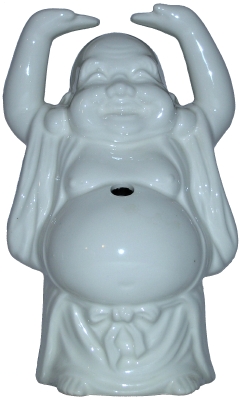
This white ceramic mug from Benihana depicts Hotei. Hotei, one of Japan’s Seven Lucky Gods, is known variously as the God of Contentment and Happiness or the “laughing buddha”. He was an eccentric Zen priest of the late Tang dynasty in China who walked around collecting offerings with a huge bag. Rubbing his stomach is said to bring good luck. I aspire to be as happy and rotund as Hotei.
On the back, stamped in ink, is “Benihana of Tokyo”. Inscribed on the bottom is “Japan”.
I have two Benihana Hotei mugs, this and another. These mugs look similar, however, this mug is larger. Also, the belt is tied differently.
Similar mugs in my collections include the Orchids of Hawaii R-95 Hotei mug and the Dynasty Wholesale DW123 Hotei mug.
Found in the Benihana, Hotei, Labeled, Mug, and Orientalia Collections.
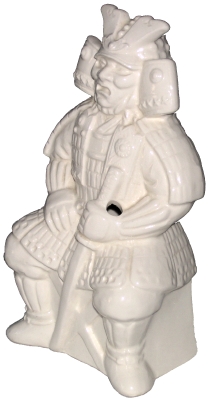
This glazed ceramic mug is nearly 9-inches tall and depicts a Samurai sitting on a crate. The samurai is wearing full battle dress and is holding a sword in his left hand.
There is an opening in the back for adding beverage and a hole for a straw near the left hand. On the back is a plastic sticker that says “Benihana of Tokyo” and inscribed on the bottom is “Japan”.
Found in the Benihana, Labeled, Mug, and Orientalia Collections.
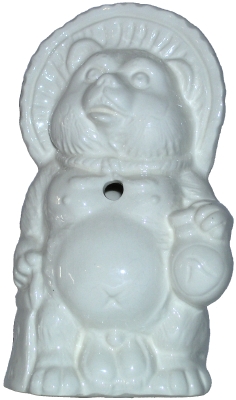
This mug depicts Tanuki, the Japanese God of Restauranters. Tanuki is holding a bottle of sake in his left hand and a promissory note for the sake in the other. He has a big fat belly, large testicles, and is wearing a straw hat. Tanuki has the power of transformation which it uses to play tricks on people. It also loves sake, which is why it has a bottle of sake in one hand.
There is an small hole in front of this mug for a straw and a large hole in the back for adding a beverage. Printed in ink on the bottom of the mug is “Benihana of Tokyo” and inscribed on the bottom is “Japan”.
Similar items in my collections include an unmarked Tanuki Mug.
Found in the Benihana, Labeled, Mug, and Orientalia Collections.
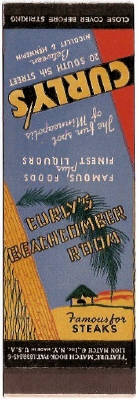
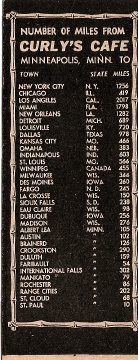
This matchbook is from Curly’s Beachcomber Room. On the front outside cover is printed “Famous Steaks and Finest Liquors”, “The Fun Spot of Minneapolis”, “Curly’s”, “20 South 5th Street”, and “Between Nicollet and Hennepin.” On the back outside cover is “Curly’s Beachcomber Room” and “Famous for Steaks” against a backdrop featuring a grass hut and a palm tree. On the inside cover is the following “Number of Miles from Curly’s Cafe, Minneapolis, Minn To” with a listing of numerous cities and the distance to them.
Found in the Labeled, Matchbook, Polynesian Pop, Tiki, and Twin Cities Collections.
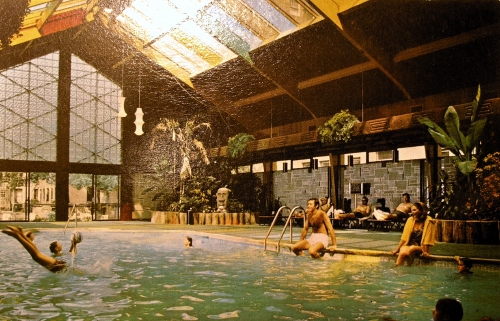
The Curtis Hotel, another Minneapolis hotel lost to time, had a tropical pool worthy of being marketed on a postcard. It was a tropical beach, with palm trees and hanging ferns, right in your hotel. If you look carefully, you will see a Tiki statue hanging out under the palm trees.
James Lileks, on his Mpls Long Gone site, has a collection of postcards for the Curtis Hotel, Minneapolis.
Found in the Labeled, Postcard, Tiki, and Twin Cities Collections.
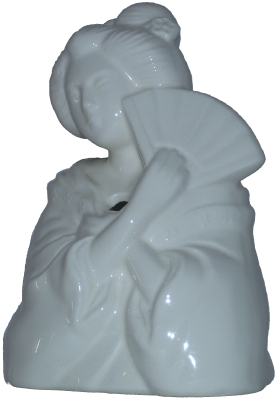
This white, ceramic mug depicts a Geisha holding a fan in her right hand. She is wearing a kimono and has a flower in her hair. On the back it reads “Ichiban” and on the bottom is “Daga ©” and “Hawaii”.
This mug is similar to the Orchids of Hawaii R-22 Geisha mug, the Dynasty Wholesale DW121 Geisha mug, and an unidentified Geisha mug.
Geisha are traditional Japanese artist-entertainers who are trained in such skills as ancient Japanese dance, singing, flower arrangement, tea ceremony, calligraphy, and conversation.
Found in the Daga Restaurant Ware, Labeled, Mug, and Orientalia Collections.

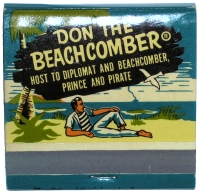
Don the Beachcombers was started in 1934 by Ernest Beaumont-Gantt. Beaumont-Gantt legally changed his name to Donn Beach. The Don the Beachcomber chained expanded to 16 locations before finally collapsing. One of those locations was in the Saint Paul Hilton in St Paul, MN.
On the front cover of this matchbook is “Greetings from Don the Beachcomber” and “Island of Mahuukona, where good rum is immortalized and drinking is an art” against a tropical island backdrop. On the reverse, it reads “Don the Beachcomber” and “Host to Diplomat and Beachcomber, Prince and Pirate” against the same tropical island backdrop but with a beachcomber lounging on the beach.
In the inside cover is a quote:
There’s nought no doubt, so much the spirit calms as rum and true religion
Don Juan, Cantoz - Stanza 34
Also is listed five locations:
Hollywood, Calif.
1727 No. McCadden Pl.
Palm Springs, Calif.
1101 No. Palm Canyon Dr.
Chicago, Illinois
101 East Walton Pl.
Hotel Sahara
Las Vegas, Nevada
Saint Paul Hilton
Saint Paul, Minnesota
Found in the Labeled, Matchbook, Polynesian Pop, and Twin Cities Collections.

The Gardens of Kona Hilton Hotel has a resident Tiki statue on the grounds.

I purchased this vintage, green, glazed ceramic Tiki mug from an antiques dealer who found it at an estate in Michigan. It was made by OMC for Harvey’s Sneaky Tiki Polynesian Lounge which was once part of Harvey’s Casino in Lake Tahoe, NV. This 16-ounce mug stands 7-inches tall and features a Tiki on the front and a torch on the back.
Written on the front in script is “Harvey’s” and on the back “Sneaky Tiki” and “Lake Tahoe”. On the bottom is a yellow-and-gold sticker that says “O M C” and “Japan”.
This mug is shown on page 57 of Tiki Quest - Collecting the Exotic Past by Duke Carter.
Found in the Labeled, Mug, Otagiri, Polynesian Pop, and Tiki Collections.
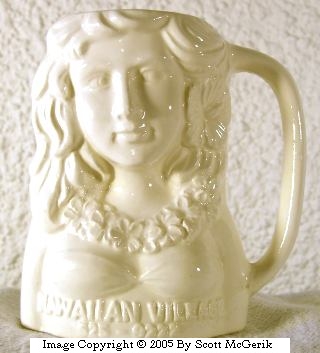
This all-white, eight-ounce, glazed ceramic mug stands 4 1/2-inches tall. It was made for the Hawaiian Village, a now-closed Polynesian restaurant located in New Westminster, BC, Canada. Hawaiian Village is mentioned on page 230 of Tiki Road Trip by James Teitelbaum.
The front of the mug depicts a Hawaiian woman with a hibiscus over her left ear and a lei about her neck. On the front it reads “Hawaiian Village” and “525-9222″ and on the bottom is imprinted “Ernelli”, “Vancouver, Canada” and “Made in Japan”.
Found in the Hawaiiana, Labeled, Mug, and Polynesian Pop Collections.
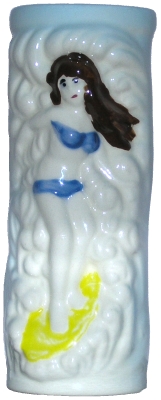
This glazed ceramic mug , most likely a reproduction of the Orchids of Hawaii R-80A Surfing Girl mug, was produced for the Hawaiian Village, a now-closed Polynesian restaurant located in New Westminster, BC, Canada. Hawaiian Village is mentioned on page 230 of Tiki Road Trip by James Teitelbaum and variants of this mug can be found on page 93 of Tiki Quest - Collecting the Exotic Past by Duke Carter.
This mug stands 6 3/4-inches tall and holds twelve ounces. On the front is brown-haired woman, wearing a blue bikini, riding a yellow surfboard. On the back are five dolphins jumping in the ocean. Also on the back are “Aloha”, “Hawaiian Village”, and “525-9222″.
Similar mugs in my collection include an Orchids of Hawaii R-80A Surfing Girl mug and an unidentified Surfing Girl mug.
Found in the Hawaiiana, Labeled, Mug, Polynesian Pop, and Tiki Collections.
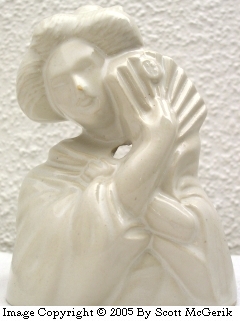

This mug depicts a Geisha who is holding a fan in her right hand and wearing a kimono. On the back it reads “Ichiban”.
This mug is similar to the Orchids of Hawaii R-22 Geisha mug and the Dynasty Wholesale DW121 Geisha mug.
Found in the Labeled, Mug, and Orientalia Collections.
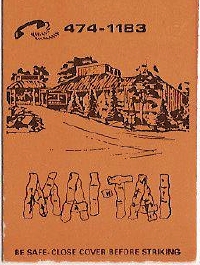
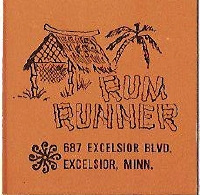
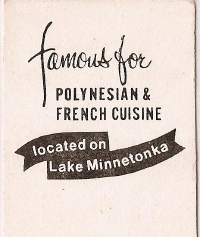
This matchbook is from the Mai Tai restaurant in Excelsior, MN. This restaurant closed in 1989 and was founded by John Logan, former head chef at the Ambassador Hotel in St. Louis Park. According to Tiki Road Trip, 2nd Ed. by James Teitelbaum, the Mai Tai was Marvel Comics kingpin Stan Lee’s favorite Tiki bar
.
On the front outside cover of the matchbook is “Mai Tai” with a drawing of a restaurant in the background. Printed on the back outside cover is printed “Rum Runner” and “687 Excelsior Blvd. Excelsior, Minn.” with a grass hut and palm tree in the background. On the inside cover is “Famous for Polynesian & French Cuisine” and “Located on Lake Minnetonka.”
In addition to this matchbox, I have a matchbox from the Mai Tai restaurant in Excelsior.
Found in the Labeled, Matchbook, Polynesian Pop, and Twin Cities Collections.

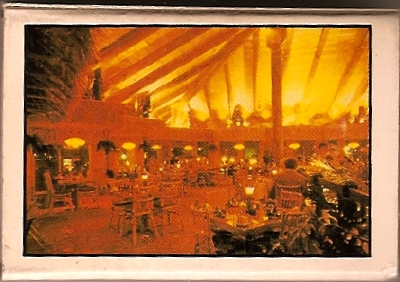
This matchbox is from the Mai Tai restaurant in Excelsior, MN. This restaurant closed in 1989 and was founded by John Logan, former head chef at the Ambassador Hotel in St. Louis Park. According to Tiki Road Trip, 2nd Ed. by James Teitelbaum, the Mai Tai was Marvel Comics kingpin Stan Lee’s favorite Tiki bar
.
On one side is “Mai-Tai” with an outdoor picture of sand, trees, and what looks like a hotel. On the other side is a picture of the interior of the Mai Tai restaurant. It has a vaulted ceiling, bamboo chairs, Tiki statues, and other Polynesian-themed items. On the side of the matchbox is “687 Excelsior Blvd.”, “Excelsior, MN”, and “474-1183″.
In addition to this matchbox, I have a matchbook from the Mai Tai restaurant in Excelsior.
Found in the Labeled, Matchbook, Polynesian Pop, and Twin Cities Collections.
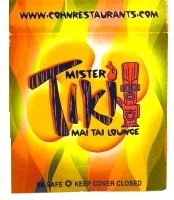
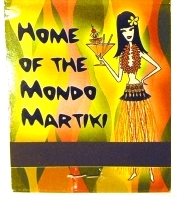
Kat and I visited the Mr Tiki Mai Tai Lounge, located in the Gaslamp District of San Diego, during the summer of 2005. I liked the Mr Tiki Mai Tai Lounge because it had a sushi bar and a sidewalk patio located at one of the busier interections in the Gaslamp District. This made for great food with great people watching. Plus, the service was good as were the drinks.
I like this matchbook because it depicts a Tiki holding a Tiki torch on one side and a wahine holding a martiki on the other. BTW, the Mondo Martiki is huge. Bring a friend or two to help you drink it.
Found in the Labeled, Matchbook, Polynesian Pop, and Tiki Collections.
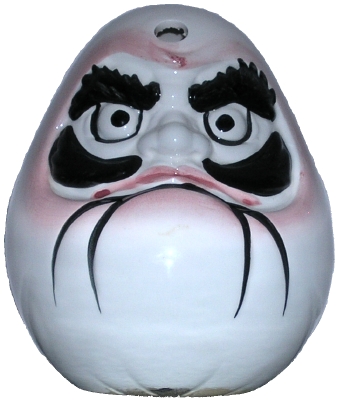
This egg-shaped, ceramic mug, depicting Daruma, has a moulded, hand-painted face of a man on the front, an opening on the back for adding a beverage, and a straw hole on the top. The man has black, bushy eyebrows and a black mustache.
Daruma is the father of Zen Buddhism.
On the back of this cup, printed in ink, are the locations and phone numbers of various Mount Fuji Japanese Steakhouses:
Mt. Fuji Fairview
201-941-2600~1
Mt. Fuji Hasbrouck Hts
201-288-2800~1
Mt. Fuji West Orenge
201-736-5255~6
Mt. Fuji Huntington
516-427-4488~9
Mt. Fuji Stanford
203-323-0211~2
Found in the Labeled, Mug, and Orientalia Collections.
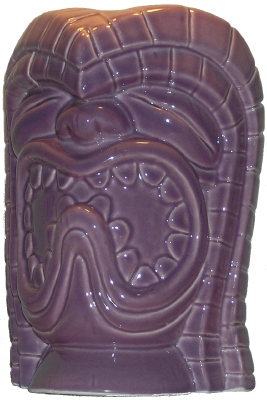
This Munktiki limited edition Tiki mug, designed by Derek Yaniger, was limited to a run of 300 mugs. My particular mug is number 156. This purple-glazed mug stands approximately 6 3/4 inches tall and depicts the Hawaiian god Ku, the god of war.
On the back of the mug is “Tiki News Presents Hawaii-a-Go-Go”, “Tiki Oasis 7″, and 2007″. On the bottom of the mug, it reads “Munktiki *Derek”, “Tiki Oasis 7″, “156-300″, and “© 2007″.
Found in the Labeled, Mug, Munktiki, Polynesian Pop, Tiki, and Tiki Conventions Collections.
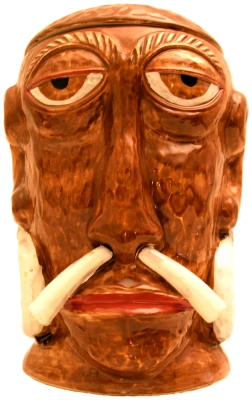
This ceramic mug of a headhunter with a bone through his nose was made by Otagiri for the Bali Hai Restaurant in San Diego, CA. On the bottom of the mug, which is concave, are the following: “‘Mr Bali Hai’ made exclusively for the Bali Hai Restaurant”, “San Diego, Calif.”
Similar mugs in my collection include the Tiki Farm Mr Bali Hai mug.
This Tiki mug can be found on page 17 of Tiki Quest - Collecting the Exotic Past by Duke Carter.
Found in the Labeled, Mug, Otagiri, and Polynesian Pop Collections.
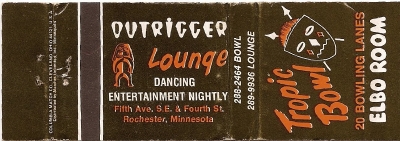
This is a matchbook cover from the Outrigger Lounge and Tropic Bowl in Rochester, MN.
On the front, outside cover is printed “Outrigger Lounge”, “Dancing Entertainment Nightly”, and “Fifth Ave S.E. & Fourth St. Rochester, Minnesota” next to a Tiki. On the other side is “Tropic Bowl”, “20 Lanes”, and “Elbo Room” and a shield with crossed spears.
Found in the Labeled, Matchbook, Polynesian Pop, and Tiki Collections.
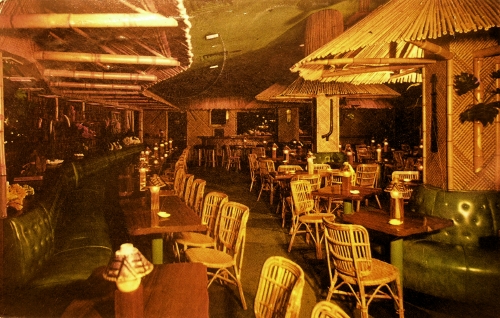
After seeing at this postcard for the Waikiki Room in the now demolished Nicollet Hotel, I wish I could travel back in time to dine at this long lost treasure of Polynesian Pop. The bamboo and rattan furniture, the green vinyl seats, and the bamboo roofs over the tables create an atmosphere of the exotic that is hard to find in modern day restaurants. I can imagine myself sitting on one of those green vinyl chairs and enjoying a Mai Tai while listening to the exotic sounds of Martin Denny.
On the back of this postcard is the following blurb:
Exotic Waikiki Room
As Hawaiian as the glowing splendor of Diamond Head . . . The Waikiki Room’s exciting tropical decor . . . its fabulous Polynesian cuisine and beverages have been imported directly from Hawaii to give you a thrilling new experience in dining pleasure.
The Pick-Nicollet
Minneapolis, Minn.
James Lileks, on his Mpls Long Gone site, has a collection of postcards for the Nicollet Hotel, Minneapolis.
Found in the Labeled, Polynesian Pop, Postcard, and Twin Cities Collections.


This glazed, ceramic Tiki mug is manufactured by Tiki Farm exclusively for Ron Jon Surf Shop. This limited edition run of 500 was designed by Drew Brophy. This large mug stands 8 inches tall and holds 23 ounces. On the front is a big-toothed Tiki, wearing shorts, with a surfboard standing upright behind him. This Tiki has noticably large arms and feet. On the reverse side, in raised relief on the base, is “Ron Jon”. Also, inscribed is “Wahgi The Wave Warrior”. Near the top is a medallion depicting a man riding a surfboard. On the bottom is “Drew by Tiki Farm © 2005″. The whole mug is brown with a wood-grain texture.
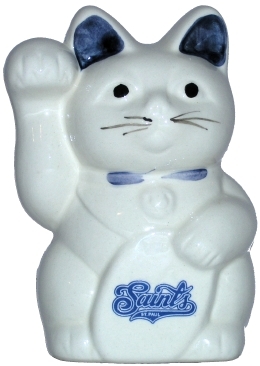
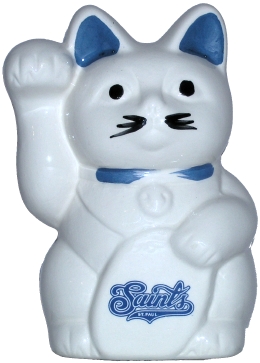
These two Maneki Neko coin banks have a St Paul Saints, a local baseball team, logo on their front. On the back is an Ichiban Japanese Steak House & Sushi Bar logo. These were given away in 2005 at a St Paul Saints game by Ichiban Japanese Steak House.
Maneki Neko translates to “Beckoning Cat” or “Welcoming Cat”. These Maneki Neko have their right paw raised which means they are inviting good fortune or money. If a left paw is raised, it is beckoning customers or people. Also, like the Japanese and unlike Americans, Maneki Neko beckons with its palm forward. The color of Maneki Neko is significant also. In the case of these, the white color signifies purity. Gold means it is inviting gold or money. A black Maneki Neko, unlike black cats, are wards against evil. Three-colored Maneki Neko are good luck charms.
Found in the Figurine, Labeled, and Orientalia Collections.
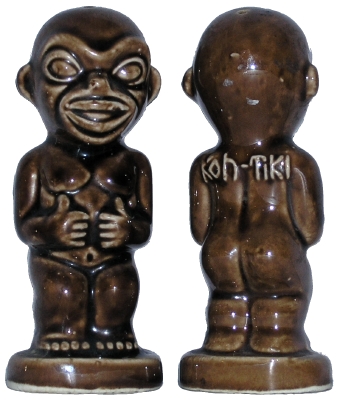
On the bottom of the shakers, it reads “Design by S Crane” and “Japan”. On the back of each is “Kon-Tiki”.
Salt and pepper shakers similar to this can be found on page 116 of Tiki Quest - Collecting the Exotic Past by Duke Carter.
Found in the Labeled, Polynesian Pop, Salt and Pepper Shakers, Steve Crane, and Tiki Collections.
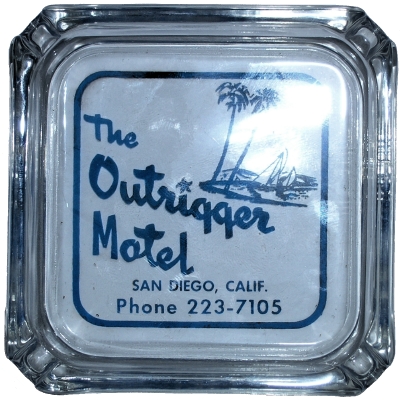
This glass ashtray is from the Outrigger Motel in San Diego, CA. Screen printed on the ashtray palm trees, sailboats, and the words “The Outrigger Motel”, “San Diego, Calif.”, and “Phone 223-7105″.
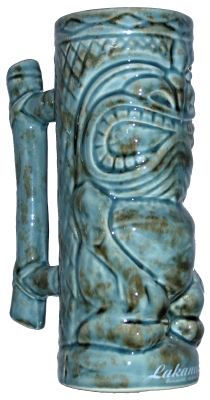
This glazed ceramic Tiki mug was produced by Tiki Farm for the Lakanuki Bar in Mammoth Lake, CA. From Tiki Farm’s website, this mug features a permanent fired decal commemorating it to the Lakanuki. The total production run on this customized mug was 147 each.
Found in the Labeled, Mug, Polynesian Pop, Tiki, and Tiki Farm Collections.
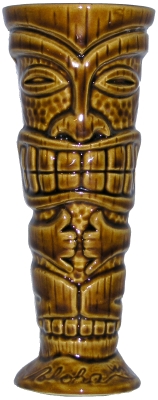
This tall, vase-like Tiki mug, produced by Tiki Farm, is known variously as the Ka Hale Tiki mug, the House of Tiki mug, and the Shaka mug. This mug depicts a Tiki with a large, toothy grin doing the shaka sign with both hands. The mug is marked to look as if carved from wood.
On the front of the base of the mug is written “Aloha” while on the back are three footprints, as if someone had walked on a sandy beach. In raised letter on the back of the mug is “Ka Hale Tiki” and in pressed lettering is “House of Tiki”, “Costa Mesa”, “Newport Bch”, and “So Cal”. On the bottom of the mug is pressed letter is “Tiki Farm © 2003″.
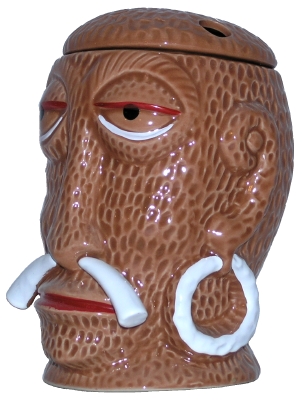
This ceramic mug, a reproduction of the original Mr. Bali Hai mug, depicts a headhunter with a bone through his nose and was produced by Tiki Farm for the Bali Hai Restaurant on Shelter Island in San Diego, CA.
On the bottom of the mug are the following: “‘Mr Bali Hai’ made exclusively for the Bali Hai Restaurant”, “San Diego, Calif.”
A variation of this Tiki mug can be found on page 17 of Tiki Quest - Collecting the Exotic Past by Duke Carter.
Found in the Labeled, Mug, Polynesian Pop, Tiki, and Tiki Farm Collections.
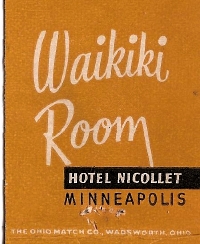
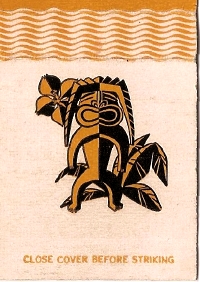

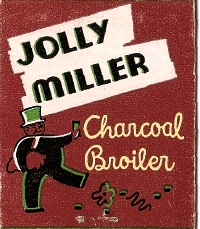
These are matchbook covers from the Waikiki Room in the Hotel Nicollet which later became the Pick-Nicollet Hotel.
The Hotel Nicollet matchbook is relatively simple with “Waikiki Room”, “Hotel Nicollet”, and “Minneapolis” on one side and a drawing of a Tiki on the other. The Pick-Nicollet matchbook cover has “Jolly Miller Charcoal Broiler” on one side with the following on the other: “Pick-Nicollet an Albert Pick Hotel”, “Minneapolis, Minn FE 3-3177″, and “Exotic Waikiki Room” with a drawing of a Tiki and a Tiki bar.
Found in the Hotei, Labeled, Matchbook, Polynesian Pop, Tiki, and Twin Cities Collections.
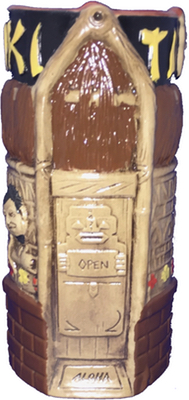

This glazed, ceramic Tiki mug is manufactured by Tiki Farm for Tiki Ti, a Polynesian-themed tiki bar on Sunset Boulevard in Los Angeles.
The mug was designed by THOR and manufactured by Tiki Farm. On the front it features a door with an "Open" sign on it. There is a door mat with the word "Aloha" on it. Across the top of the mug, are the words "Tiki Ti". On the back is "Tiki Ti", "Los Angeles", "Since 1961" and "Home of Ray's Mistake". On the bottom is Thor's signature in raised lettering and "Mfg by Tiki Farm".

This glazed, ceramic Tiki mug is manufactured by Tiki Farm for Psycho Suzi's Motor Lounge,a Polynesian-themed tiki bar in Minneapolis, MN.
The mug was designed by Tiki tOny and manufactured by Tiki Farm. This mug is in the shape of a martini glass with a tiki as the stem. On the base, in raised letters, is "Psycho Suzi's". On the bottom of the mug, are the words "Tiki tOny by Tiki Farm".
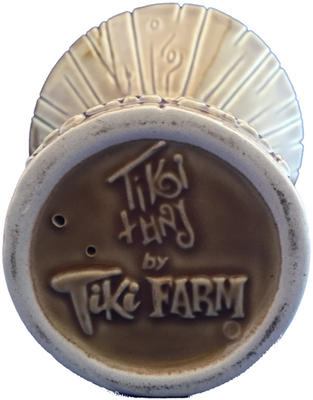


This glazed, ceramic Tiki mug was designed by Squid for The Tikiyaki Orchestra for their 2008 appearance at The Hukilau.
This mug had a limited production run of 120 mugs and came in Tahitian Blue. On the front is depicted a tiki. On the back are the words "The Tikiyaki Orchestra" and "Hukilau 2008". On the bottom is "© 2008 Squid".
Found in the Labeled, Mug, Tiki, and Tiki Conventions Collections.
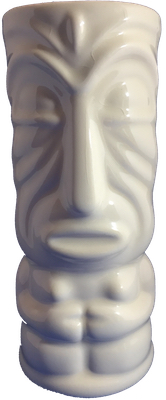
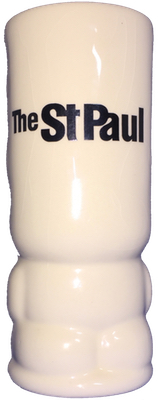
This glazed, ceramic Tiki mug is commonly known as the Droopy Tiki. It is white with the logo, "The St Paul", of the St. Paul insurance company on the back and "Modern China" and "USA" inscribed on the bottom.
Found in the Labeled, Modern China, Mug, and Tiki Collections.
All Original Content on Scott McGerik's Collections © 2002-2026 by Scott McGerik.